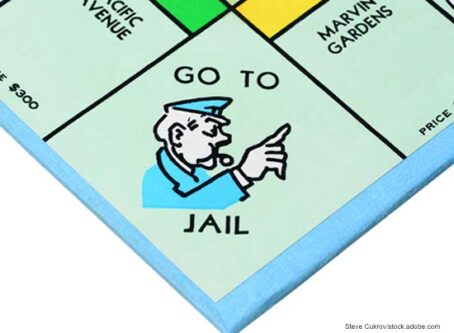Hoffa’s piggy bank in trouble again?
Last year, the feds rescued the Teamsters’ Central States Pension Fund that had once been Jimmy Hoffa’s virtual piggy bank. Back in the day, the trove of truckers’ retirement money had helped build modern Las Vegas, among other things.
Now investigators claim the government bailout included $128 million the fund had mistakenly paid out to 3,479 deceased Teamsters over a number of years. The House of Representatives wants the money back.
Whether it gets the money or not, the $35.8 billion government bailout prevented steep pension cuts for 350,000 retirees and hopefully stabilized the fund for the future. Certainly, no other pension fund ever has had such a lurid past.
The Central States Pension Fund was established by infamous Teamster President Jimmy Hoffa in 1955. He intended Central States to be unlike any other pension fund from the outset. For one thing, it would make very different investments. For another, it would be run by one person: Jimmy Hoffa.
Hoffa stuffed the fund’s board of trustees with associates who could be counted on to approve whatever he asked. He negotiated payments to Central States of $2 a week for each of a carrier’s Teamster employees. Because the union’s membership comprised the lion’s share of America’s trucking industry, it amounted to a lot of money.
While most pension funds invested in conservative government bonds and some stocks, Hoffa loaned Central States’ money to real-estate developers in Florida, Southern California and – most notably – Las Vegas. Hoffa already had mobster friends. In Las Vegas, he made more.
Nevada had legalized gambling in 1931 hoping to attract tax-paying businesses. But banks wouldn’t risk their money in a fledgling casino industry, so few entrepreneurs were willing to build serious hotel casinos. The few who did found that the only people experienced in gambling operations were the gangsters who ran illegal numbers games and sports betting in America’s big cities. Organized crime found its way into Nevada’s casinos organically and early on.
Las Vegas virtually exploded in the years after World War II, and the Teamster fund helped provide the fuel. The Teamsters were not the only investors in Nevada gambling, but they were eventually the largest and always the most colorful.
In an article titled, “What Happened in Vegas,” David Hill described the spectacular opening of Teamster-backed Caesars Palace in 1966. The three-day celebration for 1,400 invited guests included “50,000 glasses of champagne and 2 tons of filet mignon” that altogether cost $1 million – almost $10 million today.
Among the guests, according to Hill, were “John Wayne, Johnny Carson, Maureen O’Hara, Eydie Gorme – even Grant Sawyer, then the governor of Nevada.”
But the ultimate guest of honor staying in Caesars’ most extravagant guest suite was Teamster President Jimmy Hoffa.
That was pretty much the high-water mark for Hoffa and his Central States Pension Fund. Hoffa already had been convicted of witness tampering and looting the fund, among other charges, and not long after the Caesars Palace bash, he was remanded to the federal prison in Lewisburg, Pa. (There, he would collide with fellow Teamster Anthony “Tony Pro” Provensano, who would order the 1975 hit on Hoffa, it is said.)
With Hoffa in prison, his hand-picked Central State trustees appointed one mob-connected guy after another to run the truckers’ retirement fund.
The first two both went to prison. One was later executed by the mob, most likely to keep him from testifying about the fund.
Teamsters were powerful in Las Vegas to say the least, unionizing one category of workers after another, including taxi and limo drivers as well as hotel front desk clerks, housekeepers and valets. Where pension fund money financed the hotels themselves, Teamsters found themselves with interests on both sides of labor negotiations. As a result, labor contracts were all but guaranteed, and strikes were rare.
“Las Vegas was the engine that drove the mob, and the Teamsters were the engine that drove Las Vegas,” Hill wrote.
While Central States earned money from its unusual loans – many of which were never paid back – Teamster retirees didn’t necessarily benefit. The fund made it difficult for many Teamsters to collect their pensions at all. In 1976, one group of 10 drivers from Chicago sued the fund in federal court for denying pension applications despite decades of work as Teamsters.
According to The New York Times, one retired truck driver “was told by a lady at the union local in Florida that if he persisted in trying to get his pension, he could be thrown in a ditch … He went directly home and an hour later got an anonymous phone call from a man who said, ‘For $1,000 and a plane ticket, you can be killed.’”
Las Vegas, the mob and the Central States Pension Fund were attracting the wrong kind of attention. U.S. Attorney General Robert F. Kennedy set up a task force unofficially called the “Get Hoffa Squad.”
Kennedy sent Hoffa to Lewisburg while taking down a number of his mobster friends. But it wasn’t until the 1970s that the U.S. Department of Labor sued the Central States trustees and finally forced the fund to reform.
Central States money was directed away from funding Mafia ventures and into less exciting but ultimately safer investments. It all happened just in time for the fund to face an existential threat.
The Motor Carrier Act of 1980 removed the trucking regulatory structure the Teamsters had used to amass power. Operating rights were rendered moot, and virtually anyone could buy a truck and go into business. The Teamsters’ chokehold on trucking was over, and membership fell rapidly, along with driver pay. As contributing carriers went out of business, only Teamster-organized efforts in other industries kept the fund afloat.
Then, in the Great Recession of 2008, even some of the fund’s conservative investments suffered or failed altogether, and accountants warned that Central States would go belly up by 2025. To stay alive, the fund proposed slashing the pensions of those 350,000 Teamsters. But that would require the approval of the U.S. Treasury Department. It said no.
That led to intense Teamster lobbying efforts, which finally paid off. Central States was among the pension plans shored up by the American Rescue Plan Act of 2021.
The current flap over $127 million in pensions paid to dead Teamsters is more than a drop in the $35.8 billion bucket of bailout money. Still, even if Congress claws back the money, the fund will survive.
In any event, the Central States Pension Fund will have come a long, long way from the days when the retirement money for America’s truckers funded the mob and built America’s Sin City. LL









